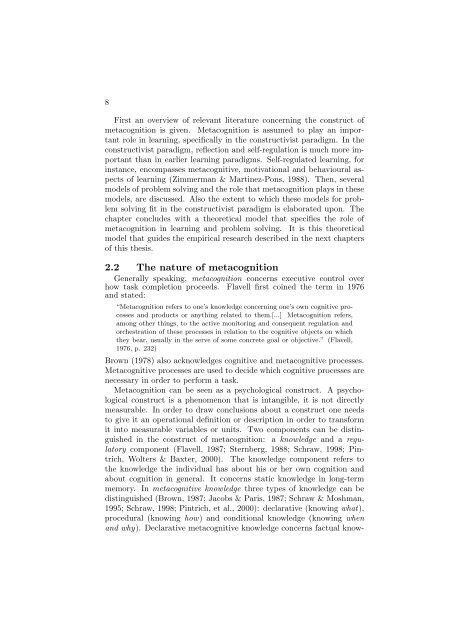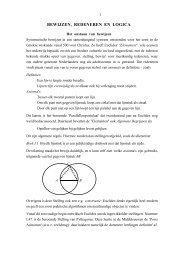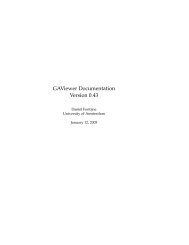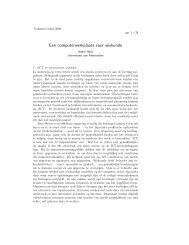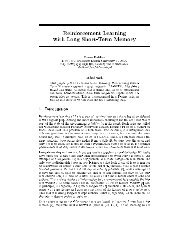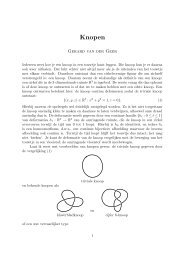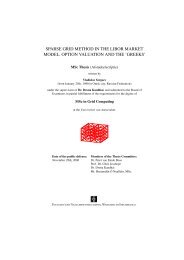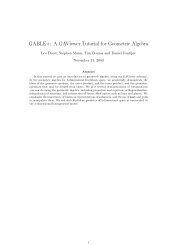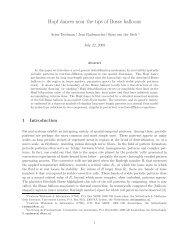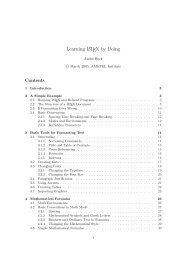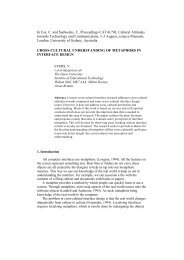The role of metacognitive skills in learning to solve problems
The role of metacognitive skills in learning to solve problems
The role of metacognitive skills in learning to solve problems
Create successful ePaper yourself
Turn your PDF publications into a flip-book with our unique Google optimized e-Paper software.
8<br />
First an overview <strong>of</strong> relevant literature concern<strong>in</strong>g the construct <strong>of</strong><br />
metacognition is given. Metacognition is assumed <strong>to</strong> play an important<br />
<strong>role</strong> <strong>in</strong> learn<strong>in</strong>g, specifically <strong>in</strong> the constructivist paradigm. In the<br />
constructivist paradigm, reflection and self-regulation is much more important<br />
than <strong>in</strong> earlier learn<strong>in</strong>g paradigms. Self-regulated learn<strong>in</strong>g, for<br />
<strong>in</strong>stance, encompasses <strong>metacognitive</strong>, motivational and behavioural aspects<br />
<strong>of</strong> learn<strong>in</strong>g (Zimmerman & Mart<strong>in</strong>ez-Pons, 1988). <strong>The</strong>n, several<br />
models <strong>of</strong> problem solv<strong>in</strong>g and the <strong>role</strong> that metacognition plays <strong>in</strong> these<br />
models, are discussed. Also the extent <strong>to</strong> which these models for problem<br />
solv<strong>in</strong>g fit <strong>in</strong> the constructivist paradigm is elaborated upon. <strong>The</strong><br />
chapter concludes with a theoretical model that specifies the <strong>role</strong> <strong>of</strong><br />
metacognition <strong>in</strong> learn<strong>in</strong>g and problem solv<strong>in</strong>g. It is this theoretical<br />
model that guides the empirical research described <strong>in</strong> the next chapters<br />
<strong>of</strong> this thesis.<br />
2.2 <strong>The</strong> nature <strong>of</strong> metacognition<br />
Generally speak<strong>in</strong>g, metacognition concerns executive control over<br />
how task completion proceeds. Flavell first co<strong>in</strong>ed the term <strong>in</strong> 1976<br />
and stated:<br />
“Metacognition refers <strong>to</strong> one’s knowledge concern<strong>in</strong>g one’s own cognitive processes<br />
and products or anyth<strong>in</strong>g related <strong>to</strong> them.[...] Metacognition refers,<br />
among other th<strong>in</strong>gs, <strong>to</strong> the active moni<strong>to</strong>r<strong>in</strong>g and consequent regulation and<br />
orchestration <strong>of</strong> these processes <strong>in</strong> relation <strong>to</strong> the cognitive objects on which<br />
they bear, usually <strong>in</strong> the serve <strong>of</strong> some concrete goal or objective.” (Flavell,<br />
1976, p. 232)<br />
Brown (1978) also acknowledges cognitive and <strong>metacognitive</strong> processes.<br />
Metacognitive processes are used <strong>to</strong> decide which cognitive processes are<br />
necessary <strong>in</strong> order <strong>to</strong> perform a task.<br />
Metacognition can be seen as a psychological construct. A psychological<br />
construct is a phenomenon that is <strong>in</strong>tangible, it is not directly<br />
measurable. In order <strong>to</strong> draw conclusions about a construct one needs<br />
<strong>to</strong> give it an operational def<strong>in</strong>ition or description <strong>in</strong> order <strong>to</strong> transform<br />
it <strong>in</strong><strong>to</strong> measurable variables or units. Two components can be dist<strong>in</strong>guished<br />
<strong>in</strong> the construct <strong>of</strong> metacognition: a knowledge and a regula<strong>to</strong>ry<br />
component (Flavell, 1987; Sternberg, 1988; Schraw, 1998; P<strong>in</strong>trich,<br />
Wolters & Baxter, 2000). <strong>The</strong> knowledge component refers <strong>to</strong><br />
the knowledge the <strong>in</strong>dividual has about his or her own cognition and<br />
about cognition <strong>in</strong> general. It concerns static knowledge <strong>in</strong> long-term<br />
memory. In <strong>metacognitive</strong> knowledge three types <strong>of</strong> knowledge can be<br />
dist<strong>in</strong>guished (Brown, 1987; Jacobs & Paris, 1987; Schraw & Moshman,<br />
1995; Schraw, 1998; P<strong>in</strong>trich, et al., 2000): declarative (know<strong>in</strong>g what),<br />
procedural (know<strong>in</strong>g how) and conditional knowledge (know<strong>in</strong>g when<br />
and why). Declarative <strong>metacognitive</strong> knowledge concerns factual know-


